Sid Meier’s Civilization is arguably the cornerstone of the 4X strategy game genre or at the very least the most popular among its contemporaries. The latest game in this monolithic series, Civilization VI, was my first exposure to this addictive genre largely thanks to a group of friends I connected with shortly after joining Catholic Game Reviews. After 200 hours of playtime I’d say I’m more or less prepared to provide a somewhat coherent critique of Civilization VI, though I recognize there are lots of people out there whose experience with the series dwarfs my own to an unfathomable degree.
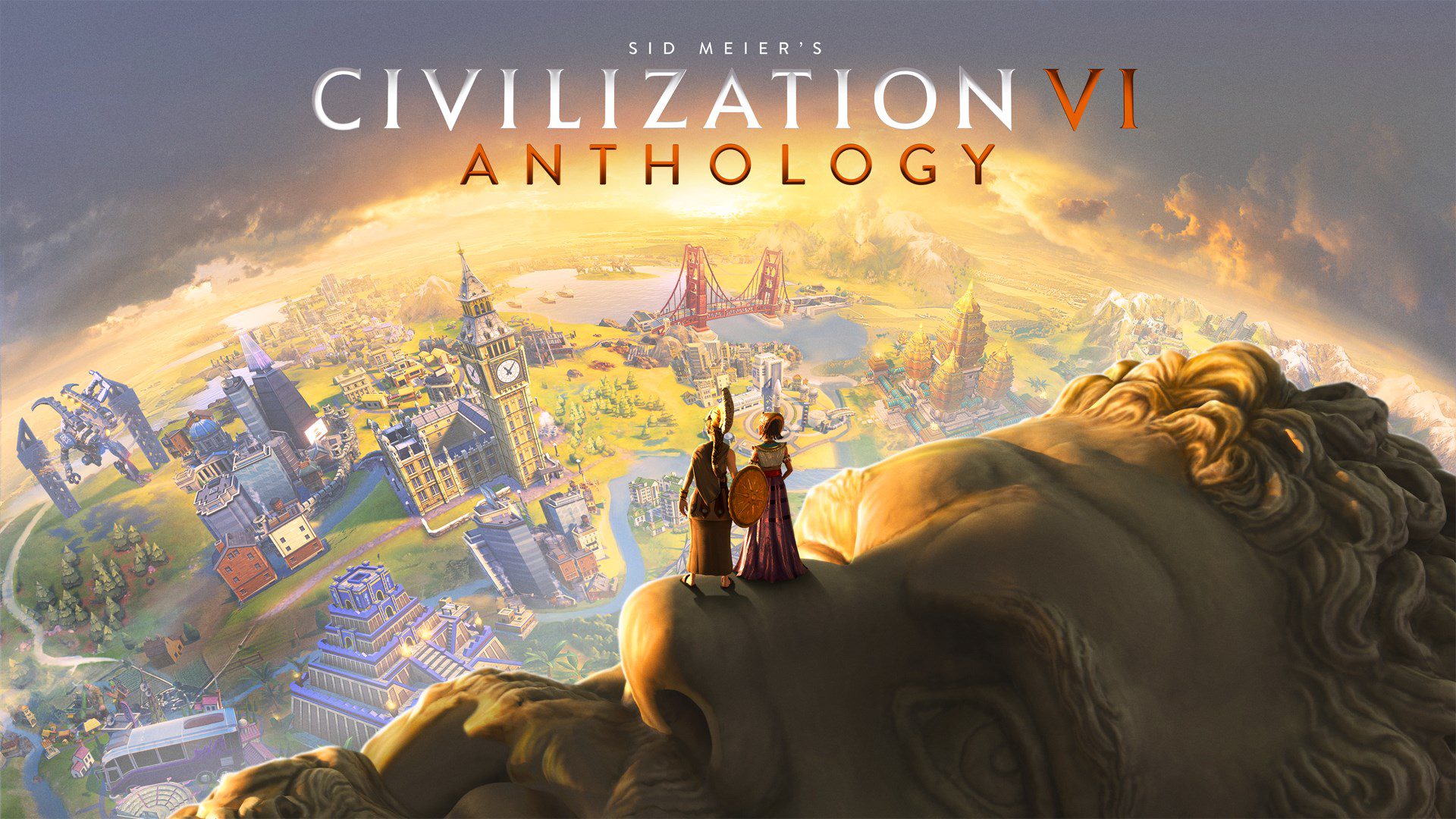
Gameplay
Civ VI takes place on a map divided into hexagonal spaces covered with randomized terrain. Players must build cities and train units to explore their surroundings, expand their empire’s sphere of influence, exploit nearby resources, and exterminate their enemies. Winning the game requires the player to meet 1 of 6 victory conditions, each of which are perfect opportunities to elaborate on the various tasks the player must manage in their empire. Domination victory requires the player to conquer the capital city of every other empire in the game. Each military unit has various strengths and weaknesses depending on the type of unit they’re engaging and the terrain they’re fighting in so maintaining a diverse army and maneuvering them into advantageous positions is critical to success.
Religious victory is achieved when the player spreads the religion founded in their empire to other cities until it is the dominant religion in all empires, similar to a domination victory – only less violent. To do this the player must generate enough faith points to purchase religious units that can expedite the spread of their religion. Science victory happens when the player becomes the first empire to complete an expedition to Mars. Players must find ways to generate as many science points as possible to quickly develop the technologies needed to win this space race. Culture victory requires the player’s empire to attract more tourists than any other empire. Tourism is accumulated by building architectural wonders and collecting great works of art.
Diplomatic victory is exclusive to the game’s second major expansion, Gathering Storm, and tasks the player with spending lots of diplomatic favor at the world congress to influence global politics. Amassing diplomatic favor is achieved primarily by influencing independent city-states and navigating alliances with other empires. Score victory occurs once the game’s turn limit is reached and no other victory condition has been achieved. Scores are calculated based on a wide range of factors so there isn’t exactly a set path to achieving this victory type. That’s every victory type in a nutshell, but there are so many factors at play that indirectly decide the course of a game that I can’t possibly name them all so I’ll go over a few of the big ones.
Producing lots of food, building adequate housing, and providing good amenities is required to maintain a large population which is happy and productive. Speaking of which, production points are needed to make units and buildings at a rapid pace. Spending gold can bypass the time needed for production, but gold is also used to maintain existing units and buildings so it can’t be used recklessly. Building districts like holy sites, campuses, and theater squares can attract Great People like prophets, scientists, and artists to your empire whose abilities can expedite your game plan if used properly.
On top of all of this each victory type is supported by investing in the other victory types as well. For instance, when shooting for a domination victory it is wise to invest in science to upgrade military units with more powerful weapons. Additionally, having a religion with combat focused beliefs can be a huge boon on the battlefield and staying on top of culture will unlock militaristic policies for your government’s agenda which can further enhance your ability to wage war.
The last mechanic I feel is worth mentioning are the specific empires the player commands. Each empire is themed around real nations and historical figures which affect how the game is played. Each empire has a civilization ability, a unique unit, unique building or district, and an ability determined by the leader representing it. For example, the Greek Empire has an additional wildcard policy slot in its government agenda, Hoplite spearmen who are more effective in combat when standing next to other Hoplites, and the Acropolis which is cheaper to build than the entertainment district, but can only be built on a tile with hills. If the Greeks are led by Pericles they gain extra culture points for every city-state they are the suzerain over, but if they are led by Gorgo they gain extra culture points for every enemy unit defeated in combat. Not every civilization has multiple leader options, but over time downloadable content has rectified this to an extent.
That’s basically the core gameplay of Civ VI, but it should be obvious by now that this game has a MASSIVE learning curve. There are a lot of things happening all at once in a single turn that need to be balanced in order for the player’s empire to remain a competitor on the road to victory. I’ll admit even after sinking so much time into Civ VI I often find myself getting discouraged and resetting my progress when I start falling behind after realizing I made a rash blunder 20 turns ago. However, when I finally got a basic grasp on how everything fits together and my empires started snowballing towards victory it was extremely satisfying. The other silver lining I can offer is that Civ VI is considered by many to be one of the easiest games in the series, so if you’re new to 4X strategy games it’s probably the best place to start.
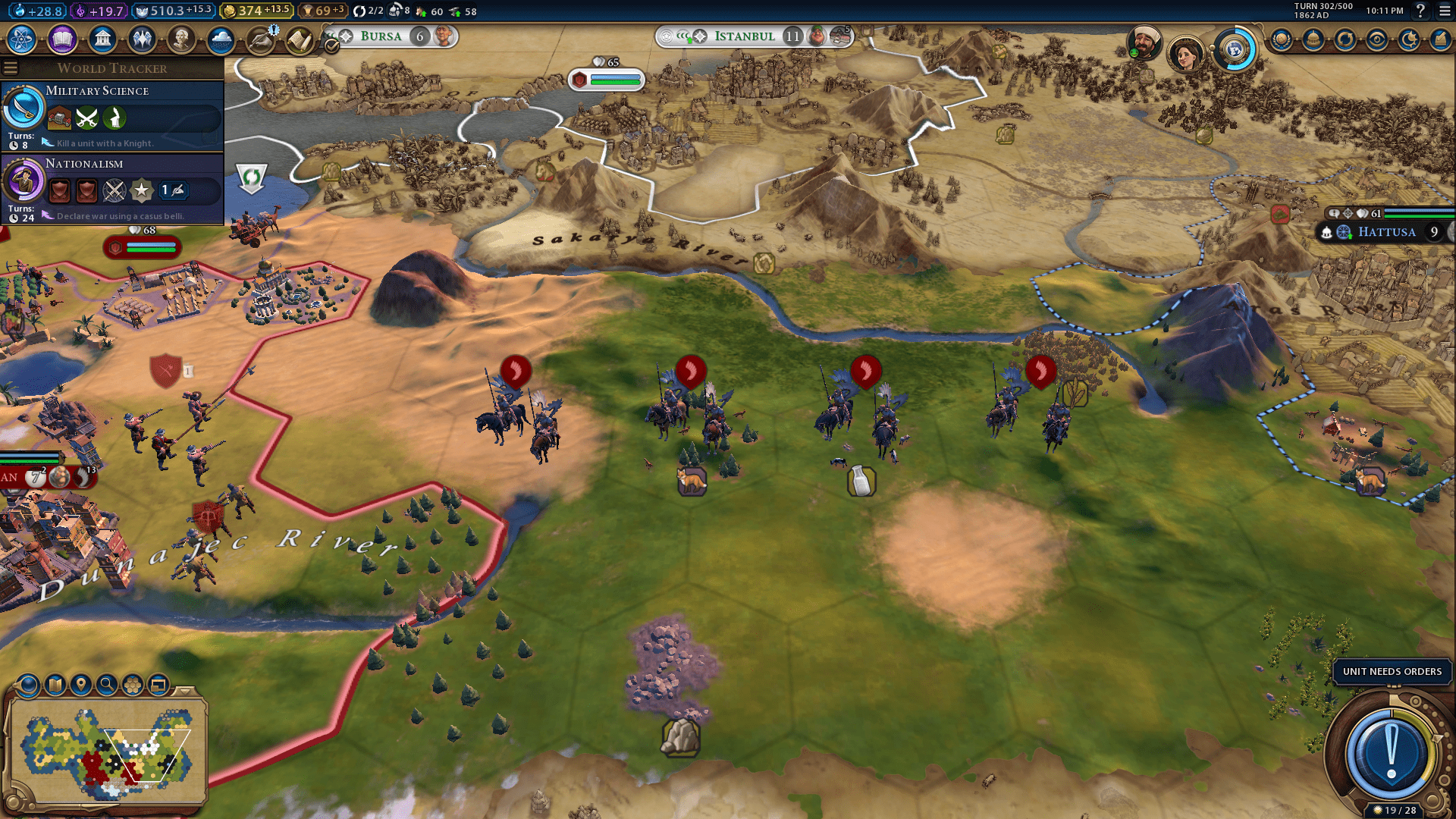
Remember the Siege of Vienna Ottomans? The Winged Hussars remember.
Downloadable Content
Over the course of 7 years Civ VI has had a sizable amount of DLC on top of the base game for better and for worse. DLC packs that add brand new empires to the game and new leaders for existing empires are fairly self explanatory and I for one quite enjoy them. They don’t drastically alter the core gameplay and they highlight interesting historical figures. Then there are the scenarios, special maps designed around specific objectives and unique mechanics themed around historical events like the Viking golden age or the Black Death. Some scenarios are better than others, but they can still be a fun distraction from the main game if you’re in the mood for something a little different so I can’t complain too much. Then there are the generically titled “game modes” which add extra mechanics into the base game such as recruiting powerful hero units or shuffling the progression order of new technologies and civics. These “game modes” certainly add a bit of spice to the game, but considering how overwhelming the base game can be at times adding more mechanics on top of it isn’t always an appealing prospect.
The real star of the show when it comes to the DLC are the game’s two major expansions which change the game drastically. The first expansion, Rise & Fall, adds a loyalty system which makes it harder to maintain control over cities and a golden age/dark age system that rewards or hinders empires based on how much they are able to accomplish within an era. I’m not against mechanics like these on paper, but they run into the same problem as “game modes” in terms of making an already complicated game even more complicated only to a much greater extent. The same can be said for the second expansion, Gathering Storm. As mentioned in my discussion of the victory types, the world congress (A.K.A. legally distinct United Nations) was added in this expansion alongside the diplomatic victory. The real stinker here however is the inclusion of natural disasters and global warming, both of which I strongly dislike for different reasons. Natural disasters are randomly occurring events that can cause massive damage to your empire’s cities which is aggressively unfun due to the way it can ruin a player’s hard work for basically no reason.
Then there’s global warming, which I despise for being a blatantly political addition to the game. I’m not going to say human activity doesn’t have an effect on the environment nor will I deny the fact that as a Catholic I believe we are called to be caretakers of God’s creation, but the need for human flourishing cannot be ignored in pursuit of environmentalism because humans are uniquely made in the image and likeness of God. This particular critique comes largely from an opinionated perspective so your experience with the global warming mechanics might be more positive if you overlook the politics.
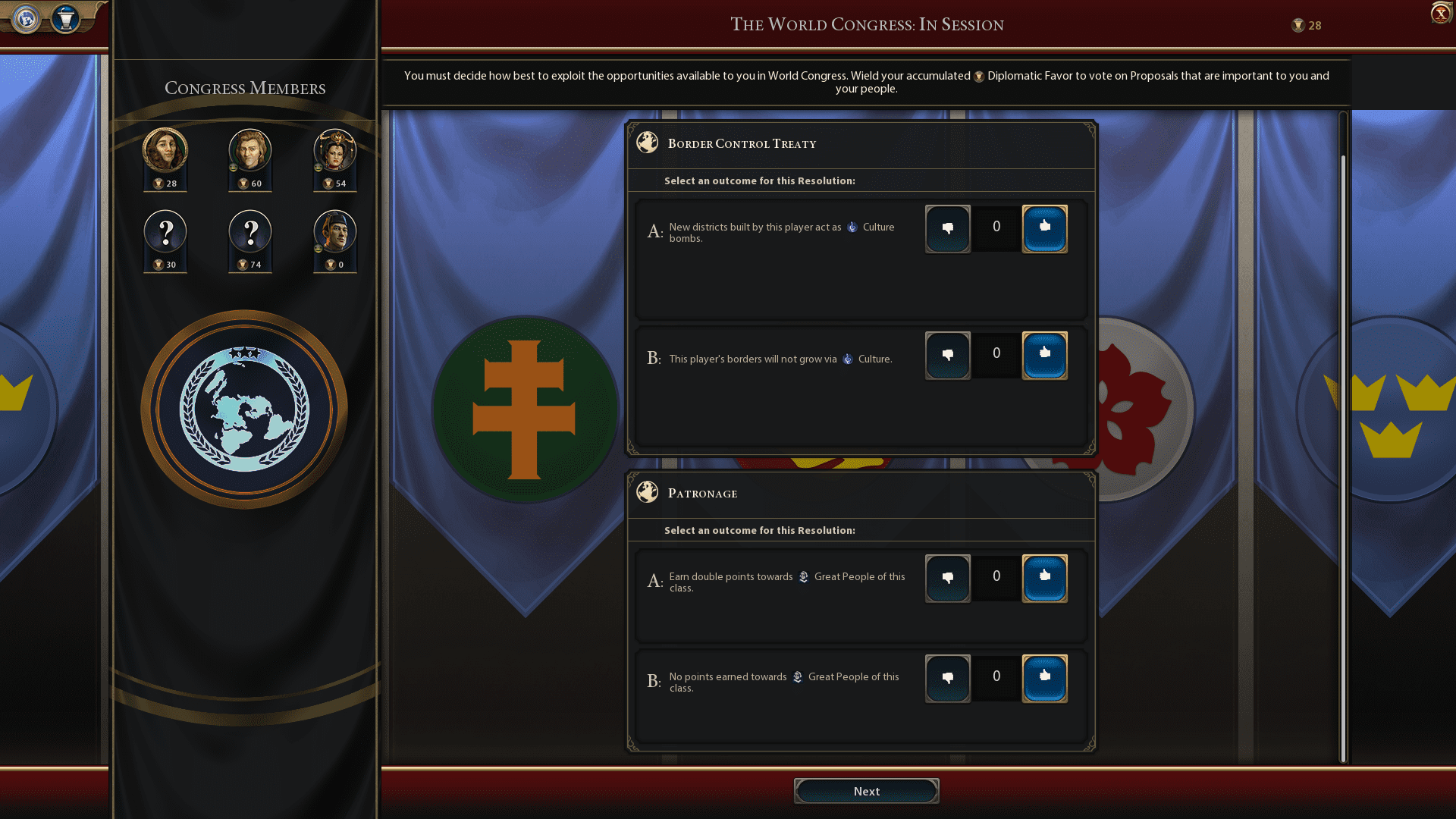
Be sure to spend diplomatic favor wisely.
Presentation
I should probably reiterate that I’m barely scratching the surface of what it’s like to play Civ VI, but for the sake of time and sanity let’s lighten the mood with some art and music. The game’s graphics are fairly cartoony with bright colors and exaggerated proportions which I enjoyed, but not without some reservations. I can see this approach aging well in the coming years, but I also feel that it sometimes lacks the gravitas needed to do these great historical figures justice. Additionally, despite being a game created primarily for computers it is poorly optimized for the platform and suffers from rather long loading times even if graphical intensity is reduced.
The game’s music on the other hand is fantastic. Every empire in the game has its own selection of music tracks that reflects its cultural heritage both in composition and instrumentation. Each empire also has a signature theme song that grows and changes overtime to reflect the progression through each era of human history which must have been no small feat on the part of the composers. The rest of the game’s sound design is perfectly fine albeit largely unremarkable. I will however give credit to the pleasant narrations which are provided by the one and only Sean Bean as well as the many voice actors for the various leaders who all speak in their empire’s mother tongue.
Last, but not least, there is the matter of Civ VI’s historicity. On the surface the game treats the various empires, leaders, and religions as nothing more than game pieces on a board with no regard for their historical implications. You can have Genghis Khan running a classical republic, building Stonehenge, and recruiting Zoroaster to found Shintoism on the belief in a river goddess who teaches the importance of Jesuit education and worshiping in synagogues and the game won’t stop you because the mechanical benefits that come with making these choices take priority over historical accuracy. If that’s where the story ended I would be disappointed, but not necessarily appalled. Then comes the game’s built in encyclopedia, the aptly named Civilopedia, where the developer’s bias is on full display. There are countless examples I could pull from, but since this is Catholic Game Reviews the choice of subject is obvious.
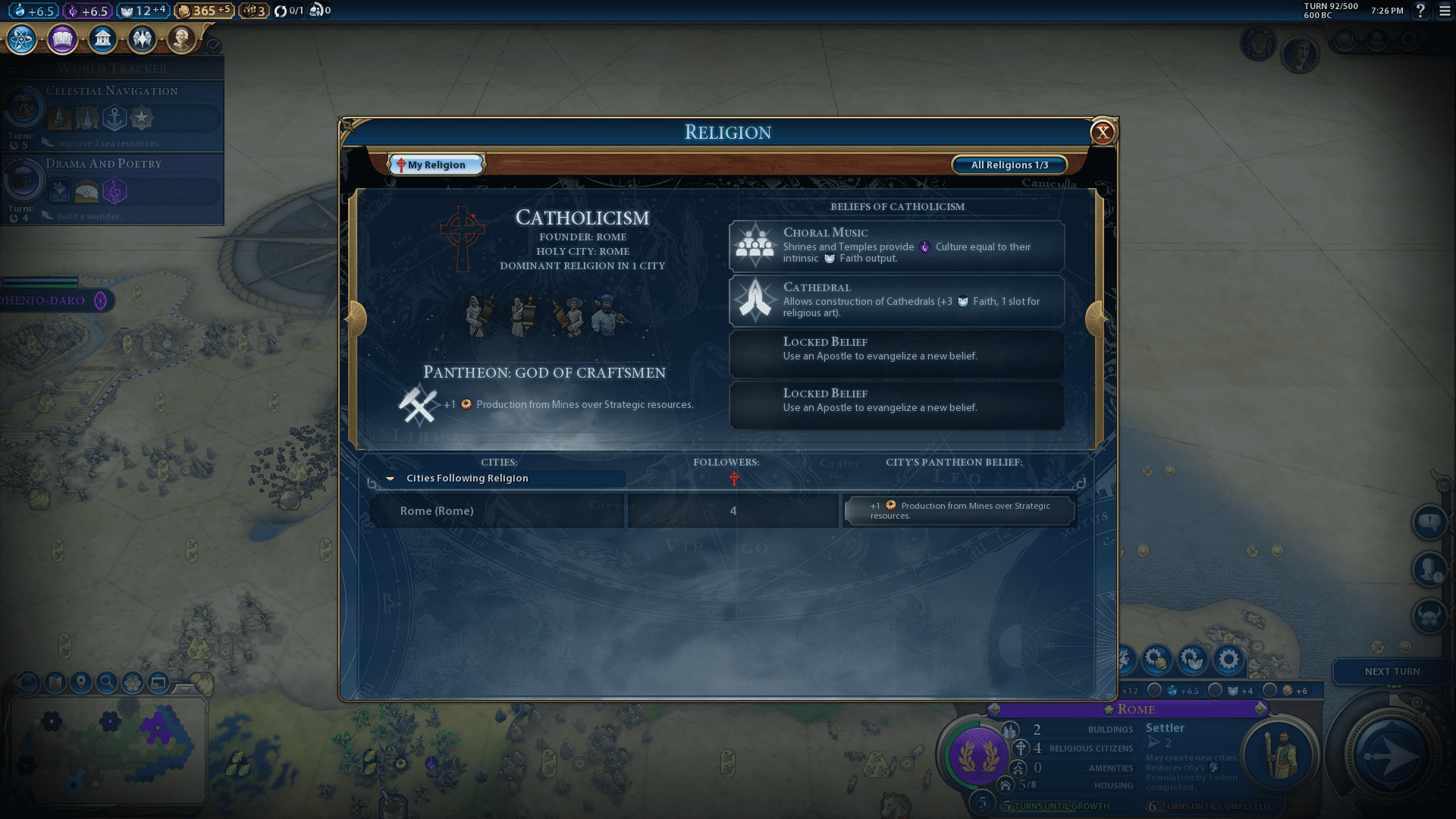
It’s hard to recreate religions perfectly, but I always try my best.
Depiction of Catholicism
The Civilopedia entries regarding the game’s various religions are mostly neutral with the exception of Catholicism, which ends on this rather unflattering remark: “A bit of a shift from the days when it burned heretics and most everyone else who differed from the Catholic dogma.” You probably don’t need me to tell you this statement clearly embraces the slanderous stereotype of Catholics as “backwards” and “intolerant” which was thrust upon them by enlightenment and postmodern thinkers. If that was the only instance of hostility I would be tempted to blow it off as a slight jab and give Civ VI a pass, but anti-Catholic sentiments permeate every Civilopedia article even slightly related to the religion. From empires to leaders to Great People and other units there are just too many instances of this madness for me to cover everything so here’s a few highlights.
In terms of broader topics that appear in multiple Civilopedia entries, crusades, inquisitions, and famous missionary expeditions are constantly interpreted in the worst way possible. The crusades are described as bloodthirsty conquests rather than defensive wars against centuries of Islamic aggression. The inquisition is portrayed as a pack of tyrannical witch hunters contrary to the evidence that it was often a much fairer system of justice than many secular institutions of its time. Even missionaries are often accused of being disingenuous actors using the faith as a political inroad to control foreign nations as opposed to being genuine servants of God called to spread his word throughout the world. I’m not saying these events are above criticism – when word of the 4th Crusade’s activities in Byzantium reached Pope Innocent III he immediately excommunicated the participants – but to pretend there were no redeeming qualities to any of them is just as bad if not worse.
There are also a plethora of more specific subjects that face unfair hostility, Catholic leaders and great people being the most obvious. Frederick Barbarossa for example is characterized largely as a violent warmonger to the point where the author somehow deems it appropriate to make jokes about his admittedly unceremonious death. I find this very disrespectful to Frederick who was in fact a very shrewd statesman who preserved the unity of a historically very volatile empire, held a genuine faith that moved him to raise the largest crusader army ever assembled in spite of his rocky relationship with the papacy, and managed to defeat both the Byzantine Empire and the Seljuk Turks when they tried to backstab him on his way to the Holy Land.
Even among Catholic leaders who are otherwise fairly well represented there’s always some sort of sly subversion, such as using Mvemba a Nzinga’s birth name by default rather than his baptismal name, Afonso I, which would have better reflected his passion for the faith he devoted his reign to spreading among his people. As for Catholic Great People, well according to the Civilopedia St. Peter is only allegedly the first Bishop of Rome, Leif Erikson’s discovery of North America is suggested to be the result of incompetent sailing, chivalric hero El Cid is described as arrogant, St. Joan of Arc is implied to be mentally insane, and the list just keeps going on and on. Bottom-line is the Civilopedia’s insistence on the most cynical and negative interpretations of Catholicism is a blatant denial of historical truth, a tremendous flaw for an otherwise well made game.
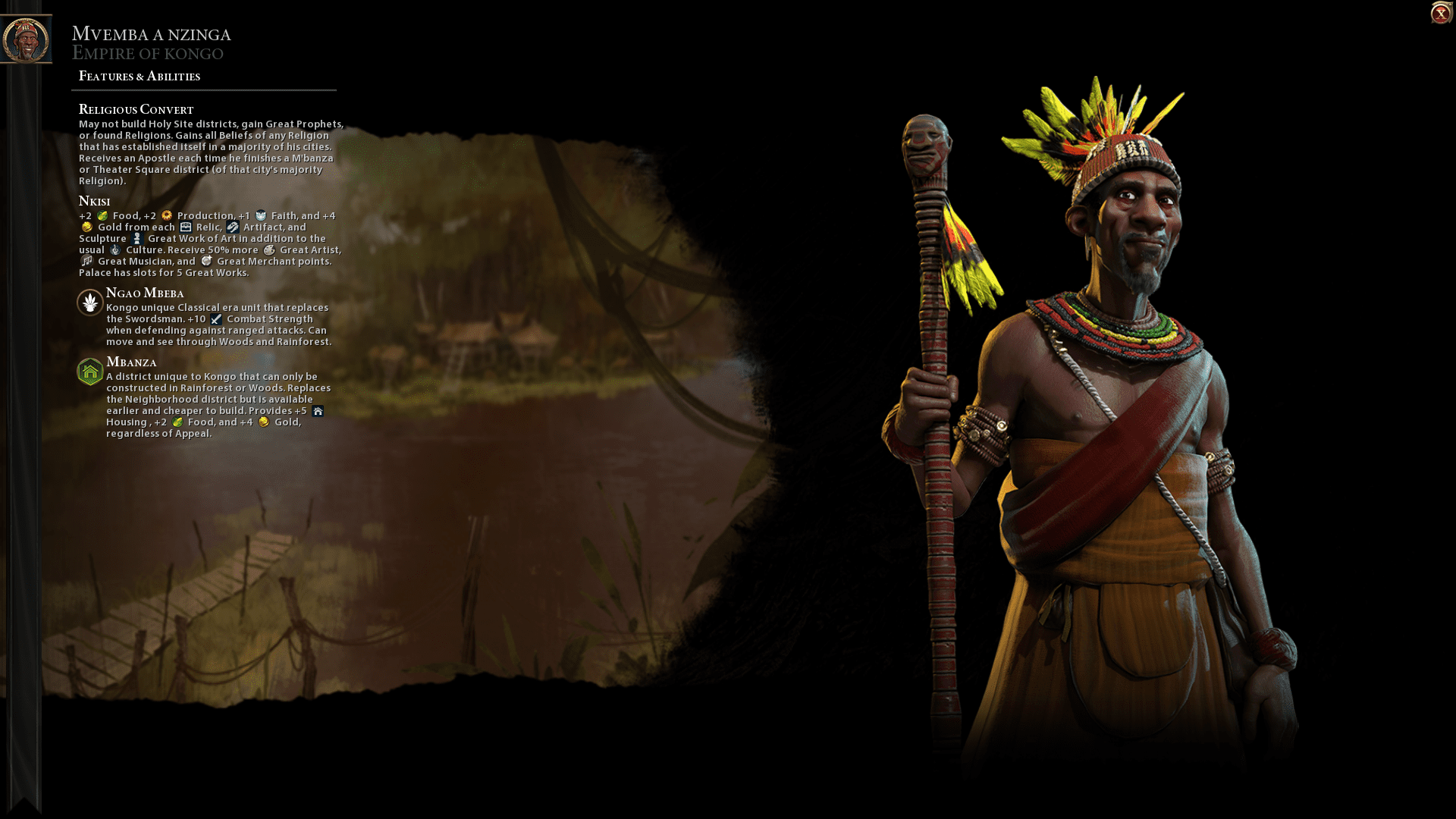
Afonso I. A true believer.
Conclusion
With all of that being said however, I still really like Civilization VI in spite of it all. The Civilopedia absolutely infuriates me to no end, but it’s not integral to the actual gameplay so it’s easy enough to ignore. The challenge of managing an empire is appealing enough on its own to keep me coming back for more. If you have the patience to learn a complex strategy game and my historical critiques haven’t completely dissuaded you of the game’s merits, Sid Meier’s Civilization VI is definitely an experience worth trying at least once or twice. Now if you’ll excuse me, I’m going to take just one more turn before going to bed. Maybe two turns. Although if I took three I could… Wait, what do you mean it’s 1:00 AM?
Scoring: 85%
Gameplay: 4/5
Visuals: 3/5
Sound: 5/5
Replayability: 5/5
Morality & Parental Warnings: Combat in Sid Meier’s Civilization VI is largely abstract and bloodless, but there is a progression from armies wielding bows and clubs to full blown thermonuclear warfare. There is also a civics tree which allows the player to develop new philosophies and ideologies over time, some of which are morally indefensible such as Communism or Fascism. There are a few instances of foul language and references to drugs. As mentioned above, the game’s built-in encyclopedia is extremely biased, particularly against Catholicism, and should never be used as an accurate source of information. The encyclopedia also has references to rape and prostitution.
